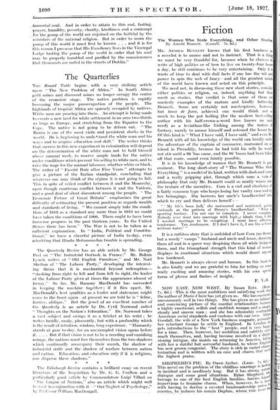The Quarterlies Round Table begins with a very striking article
upon " The New Problem of Africa." • In South Africa gold mines and diamond mines no longer occupy the centre of the economic stage: The native problem is rapidly becoming the major preoccupation of the people. The highlands of tropical Africa are sparsely occupied by natives. White men are pouring into them. An attempt is being made to create a new land for white settlement in an area two-thirds
as large as Europe, and stretching from the Equator to the • Cape. The native is not going to - he driven out. " The Bantu is one of the most virile and persistent stocks in the world. He is beginning to unde,`_tand the white man and his ways and to acquire education and skill." The writer thinks that success in thiS new experiment in colonization will depend on the determination of the white man not to hold himself above Manual work, to reserve ample lands for the native under conditions which prevent his selling to white men, and to raise the wage for the manual labourer, whether white or black. The writer of " Fascist Rule after Five Years " attempts to give a picture of the Italian standpoint, concluding that whatever one may think of the regime it is not going to fall. This in spite of veiled conflict between it and the Monarchy, open though courteous conflict between it and the Vatican, and a good deal of silent discontent among the people. " The Economic Future of Great Britain" emphasizes the great difficulty of estimating the present position as regards wealth and standards of living. "We cannot simply take the condi- tions of 1913 as a standard any more than in 1913 we could have taken the conditions of 1900. There ought to have been immense progress in the past thirteen years. In the United States there has been." The War is not to be taken as a sufficient explanation. In " India, Political and Constitu- tional," we have a cheerful picture of India to-day, even admitting that Hindu-Mohammedan trouble is spreading.
* . * The Quarterly Review has an able article by Mr. George
Peel on ." The Industrial Outlook An France." Mr. Bohtin Lynch writes of • `-‘ Old English Furniture," and iMr.• Noel Skelton of " The Labour Party," developing the interest- ing thesis that it is mechanized beyond redemption— "dashing from right to left and from left to right, the leader of the Labour Party gives at times the appearance almost of frenzy." So far, Mr. Ramsay MacDonald has succeeded in keeping the machine together ; if it flies apart, Mr. MacDonald's best qualities as a leader and statesman might come to the front again—at present we are told he is " feline, furtive, oblique." But the jewel of an excellent number of the Quarterly ..is an article by Dr. Cyril Norwood called
Thoughts on the Nation's Education." Dr. Norwood takes
a vest subject • and swings it as :a trinket at his wrist ; he Writes. lucidly, easily, pleasantly, but with a profundity which is the result of intuition, wisdom, long experience. "Humanity stands at gaze to-day, for an unexampled vision opens before it. . . But if that vision is not to be a reeeding-and vanishing mirage, the nations Must free themselves front the two shadows which continually accompany their march, the shaddw of industrial strife and the shadow of warfare between nation and nation. Education, and education only if it is religious, can disperse these shadows."
* • * * • *
The Edinburgh Review contains a brilliant essay on recent literature of the Inquisition by Mr. G. G. Coulton and a particularly good article by Commendatore Luigi Villari on "l'he League of Nations," also an article which might well be read in conjunction with it--" Our Neglect of Psychology," bj Pt-of...-essor William MseD.ougalt.


























































 Previous page
Previous page